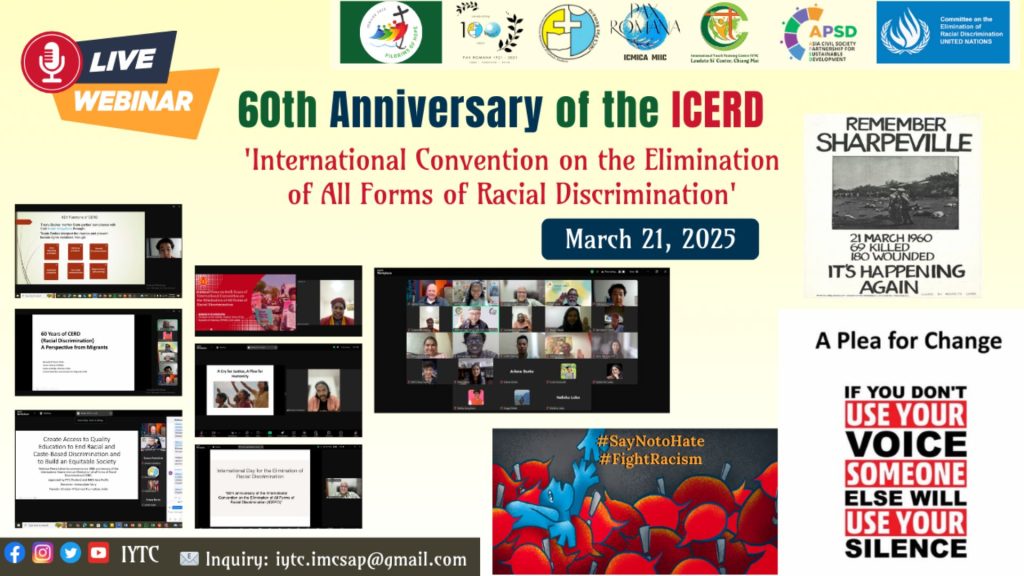The Regional Webinar on Racial Discrimination Gathered Youth, Experts, and Advocates to Advance Equity and Inclusive Policy in Asia.

The International Youth Training Center (IYTC) and Asia-Pacific Sustainable Development (APSD) organized an impactful webinar on racial discrimination and equality in Asia. This event brought together a diverse group of experts, activists, and community leaders to discuss pressing issues such as systemic inequalities, the continuing challenges of racial discrimination, and the necessary steps to foster a more inclusive society. The webinar marked the 60th anniversary of the International Convention on the Elimination of Racial Discrimination (ICERD) and underscored the urgent need for a combination of education, policy reform, and solidarity to tackle racial injustice in Asia.
A central theme of the discussion was the evolving understanding of racial discrimination. Dr. Chinsung Chung, a member of the Committee on the Elimination of Racial Discrimination (CERD), elaborated on how the committee has broadened its focus to include indirect, structural, and systemic forms of discrimination. The committee also acknowledged emerging concerns such as hate crimes, environmental racism, and discrimination within new technologies. Despite significant progress, with 180 states having ratified the ICERD, Dr. Chung pointed out that a substantial number of countries in the Asia-Pacific region have yet to ratify it, revealing a gap in international commitment to racial equality and human rights.
The ongoing struggles faced by marginalized communities, particularly in Malaysia, were also discussed in detail. Experts highlighted the need for Malaysia to ratify the ICERD and implement mandatory racial sensitivity training for civil service personnel. They emphasized the importance of acknowledging the pain of victims of discrimination and called for solidarity in the fight for racial equality. As the conversation evolved, the speakers stressed the need for a unified approach to addressing racial discrimination, one that recognizes the deep-rooted social, economic, and cultural factors that perpetuate these inequalities.
Bernard, a key speaker, provided an insightful analysis of global migration corridors, particularly those in the Mediterranean, Mexico, and the Gulf regions. He illuminated the severe challenges faced by migrant workers, including exploitation, racism, and xenophobia. Bernard strongly criticized both sending and receiving countries for their lack of effective policies and protections for migrant workers, especially the undocumented ones who face additional barriers to their rights and safety. He argued that current efforts to protect migrant workers remain insufficient, stressing the need for better, more inclusive policies and stronger international cooperation to address these challenges.
The discussion then turned to the importance of inclusive education as a fundamental tool for building a more equitable society. Imma Mary, an educator and Dalit rights activist, shared her personal insights on the obstacles faced by marginalized communities, particularly Dalits and Adivasis in India, in accessing quality education. She highlighted the systemic barriers that prevent these communities from achieving educational success and urged university students, faith-based organizations, and policymakers to take meaningful actions. These actions should include establishing mentorship programs, offering digital literacy camps, and advocating for education reforms that address caste-based discrimination in schools. Imma’s call to action emphasized the necessity of creating accessible and inclusive educational environments for marginalized groups.
Sumeera’s personal testimony brought an emotional and powerful layer to the conversation. She shared the challenges faced by the Tamil people in Sri Lanka, particularly the exploitation of plantation workers who lack proper registration and face unfair wages. Sumeera’s poignant account of her own experiences of abandonment and violence underscored the urgent need for justice and dignity for marginalized groups. She concluded her testimony by calling for collective action to fight for justice and an end to racial discrimination, urging all participants to unite in their efforts toward systemic change.
In Indonesia, Susana presented a sobering analysis of the country’s high ranking in global racial discrimination indices, pointing out the factors that contribute to the persistence of racial inequalities in Indonesian society. She referenced a key event from 1998 involving the mistreatment of Papuan students in Surabaya and discussed how these issues continue to shape racial relations in the country today. Susana emphasized the importance of addressing racial discrimination through education, social campaigns, and fostering dialogue between ethnic and religious groups to reduce racial biases and promote social cohesion.
As the webinar came to a close, the speakers outlined a series of actionable steps to sustain the momentum in combating racial discrimination. IYTC and APSD pledged to continue organizing seminars on the intersection of the Sustainable Development Goals (SDGs) and human rights issues, providing a platform for ongoing education and advocacy. University students were encouraged to engage in “reach and teach” initiatives within marginalized communities to help build critical thinking skills. Additionally, educators were urged to develop mentorship programs for Dalit students to help them overcome barriers to higher education and career success. Civil society organizations were encouraged to conduct research on exclusion and discrimination, advocating for policy changes that would ensure equal opportunities for all.
Faith-based organizations were also called to make their institutions more inclusive and accessible to the poor, Dalits, and minorities, ensuring that no one is left behind in the pursuit of a fairer society. Educational institutions were encouraged to offer scholarships and preparatory programs to create a more level playing field for marginalized students. Teacher training programs focused on compassion and inclusivity were also recommended to equip educators with the tools necessary to address the needs of all students, regardless of their background.
The webinar ended with a call for continued collaboration and advocacy to push for the ratification of ICERD in countries that have yet to sign the convention, and for civil society groups to advocate for comprehensive policy changes at both the national and international levels. As the conversation highlighted, tackling racial discrimination requires a multi-faceted approach involving governments, civil society, faith-based organizations, and individuals. By working together, stakeholders can create a more inclusive, equitable society for all.
The webinar concluded with concrete action points to sustain momentum in the fight against racial discrimination:
- Continuous Learning & Advocacy: IYTC and APSD will organize further seminars on SDGs and their intersection with human rights issues.
- Community Engagement: University students will initiate “reach and teach” programs in marginalized communities to strengthen critical thinking and foundational skills.
- Mentorship for First-Generation Learners: Educators will establish mentorship programs specifically for Dalit students to support their academic and professional growth.
- Research & Policy Influence: Civil society organizations will conduct research on exclusion and discrimination to inform policy discussions.
- Faith-Based Initiatives: Religious institutions will work towards inclusivity, ensuring accessibility for Dalits, minorities, and economically disadvantaged groups.
- Educational Support: Scholarships and preparatory programs will be introduced to create equal opportunities for marginalized students.
- Teacher Training: Schools will implement training programs to equip teachers with knowledge on compassion and inclusivity.
- Policy Advocacy: Civil society organizations will advocate for legislative changes to combat racial discrimination.
- International Collaboration: The ICERD Committee will collaborate with the Committee on Migrant Workers to develop a general recommendation on xenophobia.
- Ratification of ICERD: Civil society groups will push for ICERD ratification in countries that have yet to sign the convention.
The webinar on racial discrimination in Asia served as a vital platform for dialogue, education, and action. It reinforced the importance of policy changes, grassroots activism, and global solidarity in addressing racial discrimination. As stakeholders continue their efforts, sustained collaboration and commitment will be crucial in creating a more just and equitable society for all.
Share This:

IMCS Asia Pacific
The International Movement of Catholic Students (IMCS) Asia Pacific is a dynamic regional organization dedicated to empowering young Catholics to actively engage in social justice, human rights, and sustainable development. Through education, advocacy, and collaboration, IMCS aims to nurture leadership, build solidarity, and inspire students to be agents of change within their communities and beyond.
@2020 - IMCS AP - All Rights Reserved.

Leave a Reply